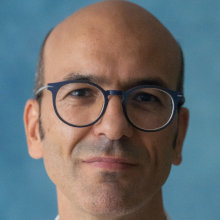Linguistic and Cultural Mediation [LT5-21-21]
Enrolled in a.y. 2021/2022

Stefano PETRUNGARO
- Qualifica
- Professore Associato
- Incarichi
-
Componente del Comitato Direttivo dell' "Osservatorio di Politica e Relazioni Internazionali (OPRI)"
Componente del Comitato Scientifico del Centro interdipartimentale di Studi Storici sul cristianesimo (CISC)
Delegato alla Ricerca
- Telefono
- 041 234 7837
-
stefano.petrungaro@unive.it
- SSD
- Storia dell'Europa orientale [HIST-03/B]
- Sito web
-
www.unive.it/persone/stefano.petrungaro (scheda personale)
- Struttura
-
Dipartimento di Studi Linguistici e Culturali Comparati
Sito web struttura: https://www.unive.it/dslcc
Sede: Palazzo Cosulich
(in English below)
STEFANO PETRUNGARO è uno storico dell'Europa Orientale in epoca contemporanea. Membro Associato presso il CETOBaC - Centre d’Études Turques, Ottomanes, Balkaniques et Centrasiatiques (EHESS, CNR, Collège de France), Parigi, prima di arrivare a Ca' Foscari era Senior Researcher presso l´IOS (Istituto di Studi sull´Europa Orientale e Sudorientale) di Ratisbona, in Germania (2012-2017).
Stefano Petrungaro ha condotto i suoi studi presso l’Università Ca’ Foscari di Venezia, laureandosi in Storia nel 2002 e conseguendo un Dottorato in Storia sociale nel 2006. Ha svolto soggiorni di studio e di ricerca in Germania (Göttingen, 2000) in Croazia, Serbia e Bosnia-Erzegovina (Zagabria, Belgrado, Sarajevo, dal 2001 in poi) e, quale borsista dello European Doctorate in the Social History of Europe and the Mediterranean, presso la SSEES (School of Slavonic and East European Studies) dello UCL (University College of London) (2004). È stato visiting scholar presso il GWZO (Geisteswissenschaftliches Zentrum Geschichte und Kultur Mittelosteuropas) dell´Università di Lipsia (2006, 2007), assegnista di ricerca presso l´Università di Padova (2008-2012), professore a contratto presso l´Università di Zagabria (2007-2012), e ha svolto attività didattica presso l´Università di Ratisbona (2014-2017). Nel 2021 ha conseguito una Habilitation, ossia l'abilitazione tedesca per l'insegnamento accademico.
È stato redattore di “900. Per una storia del tempo presente”, membro del Comitato scientifico-editoriale della Società italiana di storia del lavoro (SISLav), e del Comitato scientifico della Cost-Action "Who Cares in Europe?" (https://whocaresineurope.eu/ ). Attualmente è membro della direzione di «Passato e presente. Rivista di storia contemporanea», del Comitato di consulenza internazionale di "Historijski zbornik" (Zagabria) e "Südost-Forschungen" (Regensburg).
E' stato Coordinatore del corso di Laurea magistrale in Relazioni internazionali comparate, è attualmente Delegato alla ricerca del Dipartimento, e membro del Direttivo del Dottorato in Studi storici, geografici e antropologici (Università di Padova, Università Ca' Foscari Venezia).
Principali ambiti di ricerca
marginalità sociale e storia del lavoro in Europa Orientale
storia culturale e sociale del tardo impero asburgico
storia dei fenomeni violenti balcanici otto-novecenteschi
memorie collettive, storiografie e uso pubblico della storia
Principali pubblicazioni
marginalità sociale e storia del lavoro in Europa Orientale:
- Michele Mioni, Stefano Petrungaro (eds), Caring for the Socially Marginalised in Interwar Europe, 1919-1939: The Mixed Economy of Welfare, Palgrave Macmillan, London-New York, 2024.
- Philipp Ther, Ulf Brunnbauer, Piotr Filipkowski, Andrew Hodges, Stefano Petrungaro, Peter Wegenschimmel, In den Stürmen der Transformation. Zwei Werften zwischen Sozialismus und EU, Suhrkamp, Berlin 2022 (ed. in inglese: In the Storms of Transformation: Two Shipyards between Socialism and the EU, University of Toronto Press, Toronto, 2024, in corso di stampa).
- Stefano Petrungaro, Police and prostitution in Yugoslavia: a nuanced relationship, in “European Review of History”, vol. 29 (2022), nr. 2, pp. 170-193.
- Stefano Petrungaro, Soup Kitchens and the Yugoslav Poor Relief between the two World Wars, in: Fabio Giomi, Stefano Petrungaro (eds.), Voluntary Associations in Yugoslavia, 1918-1941, Special Issue, «European Review of History», 26 (2019), 1, pp. 141-162.
- Stefano Petrungaro, The Medical Debate about Prostitution and Venereal Diseases in Yugoslavia (1918-1941), «Social History of Medicine», 32 (2019), 1, pp. 121-142.
- Stefano Petrungaro, Mendiants et philanthropie dans la Yougoslavie de l’entre-deux-guerres, in «Revue d’histoire de la protection sociale», 11 (2018), 1, pp. 92-116.
- Stefano Petrungaro, Inter-war Yugoslavia Seen Through Corporatist Glasses, in Antonio Costa Pinto (ed.), Corporatism and Fascism. The Corporatist Wave in Europe, Routledge, London 2017, pp. 236-256.
- Stefano Petrungaro, Hostels for Jobless Workers in Interwar Yugoslavia (1921-1941), in «International Review of Social History», 59 (2014), 3, pp. 443–471.
- Stefano Petrungaro, The Fluid Boundaries of “Work”. Some Considerations about Concepts, Approaches, and South-Eastern Europe, in «Südost-Forschungen», 72 (2013), pp. 271-286.
- Laura Cerasi, Rolf Petri, Stefano Petrungaro, Porti di frontiera. Industria e commercio a Trieste, Fiume e Pola tra le guerre mondiali, Viella, Roma 2008.
progetti in corso:
- Strange Jobs. Social Marginalization and the Work in Yugoslavia (1918-1941) (book project, under review)
storia culturale e sociale del tardo impero asburgico:
- Stefano Petrungaro, Popular Protest Against Hungarian Symbols in Croatia (1883-1903). A Study in Visual History, in: «Cultural and Social History. The Journal of the Social History Society», 13 (2016), 4, pp. 503-520.
- Stefano Petrungaro, Fire and Honour. On the Comparability of Popular Protests in late 19th Century Croatia-Slavonia, in Sabine Rutar (a cura di), Beyond the Balkans. Towards an Inclusive History of Southeastern Europe, Lit, Wien, 2014, pp. 247-263.
- Stefano Petrungaro, Die Verteidiger der Eliten. Das Gericht als Arena der Elitenvergesellschaftung in Kroatien-Slawonien (zweite Hälfte des 19. Jhr.), in Karsten Holste, Dietlind Hüchtker, Michael G. Müller (a cura di), Aufsteigen und Obenbleiben in europäischen Gesellschaften des 19. Jahrhunderts. Akteure – Arenen – Aushandlungsprozesse, Akademieverlag, Berlin 2009, pp. 83-98.
- Stefano Petrungaro, Pietre e fucili. La protesta sociale nelle campagne croate di fine Ottocento, Viella, Roma 2009 (traduzione croata: Kamenje i puške. Društveni protest na hrvatskom selu krajem XIX. stoljeća, trad. di Jasna Rešić Srednja Europa, Zagreb 2011)
- Stefano Petrungaro (a cura di), Fratelli di chi. Libertà, uguaglianza e guerra nel Quarantotto asburgico, Edizioni Spartaco, Santa Maria Capua Vetere (CE) 2008.
storia dei fenomeni violenti balcanici otto-novecenteschi:
- Stefano Petrungaro, Tra particolare e generale. Sulla violenza nei Balcani, in: Rolf Petri (a cura di), Balcani, Europa: violenza, politica, memoria, Giappichelli, Torino 2017, pp. 23-34.
- Stefano Petrungaro, Balcani. Una storia di violenza?, Carocci, Roma 2012.
- Stefano Petrungaro, Armate asburgiche. Sulla militanza armata femminile, in S. Petrungaro (a cura di), Fratelli di chi. Libertà, uguaglianza e guerra nel Quarantotto asburgico, Edizioni Spartaco, Santa Maria Capua Vetere (CE) 2008, pp. 113-138.
memorie collettive, storiografie e uso pubblico della storia
- Stefano Petrungaro, La ricerca sull´Europa orientale in Germania, «Passato e presente. Rivista di storia contemporanea», 33 (2015), 95, pp. 101-120.
- Stefano Petrungaro, Il nation-building in Croazia. Gli studi recenti, in «Memoria e ricerca», 30, 2009/2, pp. 129-146.
- Stefano Petrungaro, Riscrivere la storia. Il caso della manualistica croata (1918-2004), prefaz. di Stuart J. Woolf, Stylos, Aosta 2006 (ed. croata: Pisati povijest iznova. Hrvatski udžbenici povijesti 1918.-2004. godine, trad. di Franko Dota, Srednja Europa, Zagreb 2009.)
- Stefano Petrungaro, Gli istituti statali di storia contemporanea nei paesi successori della Jugoslavia. Uno sguardo d’insieme, in «Quaderni storici», a. XLIII (2008), f. 2, n. 128, pp. 433-453.
ricerche in corso:
Fosse comuni. Per una storia della necropolitica in Europa orientale.
Stefano Petrungaro, Ph.D., is currently Associate Professor at Ca’ Foscari University in Venice, Italy. Before joining Ca’ Foscari, he was Senior Researcher at the Leibniz Institute for East and Southeast European Studies in Regensburg, Germany (2012-2017). He graduated (2002) and earned his Ph.D. in European Social History at the University Ca´ Foscari in Venice (2006), after a research stay within the framework of the European Doctorate in the Social History of Europe and the Mediterranean at SSEES (School for Slavonic and East European Studies), UCL (University College of London) (2004). He was visiting research fellow at the GWZO (Geisteswissenschaftliches Zentrum Geschichte und Kultur Ostmitteleuropas) in Leipzig (2006, 2007), visiting lecturer at the University of Zagreb (2007-2011), and post-doc research fellow at the University of Padua (2008–2011). In 2021 he obtained a Habilitation, ie. the German academic qualification for teaching History of Southeast and Eastern Europe.
He has been member of the editorial board of the academic periodical “900. Per una storia del tempo presente”. He is actually member of the editorial board of the academic journal “Passato e presente. Rivista di storia contemporanea“, and member of the editorial academic board of the “Labour History Studies Series” edited by SISLav (Italian Society of Labour History), and of the Scientific Committee of the Cost-Action "Who Cares in Europe?" (https://whocaresineurope.eu/ ). He is also member of the international advisory board of "Historijski zbornik" (Zagreb) and "Südost-Forschungen" (Regensburg).
He is Coordinator of the Master's Degree Programme in "Comparative International Relations", and member of the Management Board of the Ph.D. Programme in Historical, Geographical and Anthropological Studies (University of Padova, Ca' foscari University of Venice, University of Verona).
Main research interests:
- social marginality and labour history in Eastern Europe
- cultural and social history of the late Habsburg Empire (with particular attention to popular protest)
- history of violence in South-Eastern Europe (19th-20th century)
- collective memories, historiography, public uses of the past
Main publications:
- social marginality and labour history in Eastern Europe
- Michele Mioni, Stefano Petrungaro (eds), Caring for the Socially Marginalised in Interwar Europe, 1919-1939: The Mixed Economy of Welfare, Palgrave Macmillan, London-New York, 2024.
- Philipp Ther, Ulf Brunnbauer, Piotr Filipkowski, Andrew Hodges, Stefano Petrungaro, Peter Wegenschimmel, In den Stürmen der Transformation. Zwei Werften zwischen Sozialismus und EU, Suhrkamp, Berlin 2022 (English ed.: In the Storms of Transformation: Two Shipyards between Socialism and the EU, University of Toronto Press, Toronto, 2024, in press).
Stefano Petrungaro, Police and prostitution in Yugoslavia: a nuanced relationship, in “European Review of History”, vol. 29 (2022), nr. 2, pp. 170-193.
- Stefano Petrungaro, Soup Kitchens and the Yugoslav Poor Relief between the two World Wars, in: Fabio Giomi, Stefano Petrungaro (eds.), Voluntary Associations in Yugoslavia, 1918-1941, Special Issue, «European Review of History», 26 (2019), 1, pp. 141-162.
- Stefano Petrungaro, The Medical Debate about Prostitution and Venereal Diseases in Yugoslavia (1918-1941), «Social History of Medicine», 32 (2019), 1, pp. 121-142.
- Stefano Petrungaro, Mendiants et philanthropie dans la Yougoslavie de l’entre-deux-guerres, in «Revue d’histoire de la protection sociale», 11 (2018), 1, pp. 92-116.
- Stefano Petrungaro, Inter-war Yugoslavia Seen Through Corporatist Glasses, in Antonio Costa Pinto (ed.), Corporatism and Fascism. The Corporatist Wave in Europe, Routledge, London 2017, pp. 236-256.
- Stefano Petrungaro, Hostels for Jobless Workers in Interwar Yugoslavia (1921-1941), in «International Review of Social History», 59 (2014), 3, pp. 443–471.
- Stefano Petrungaro, The Fluid Boundaries of “Work”. Some Considerations about Concepts, Approaches, and South-Eastern Europe, in «Südost-Forschungen», 72 (2013), pp. 271-286.
- Laura Cerasi, Rolf Petri, Stefano Petrungaro, Porti di frontiera. Industria e commercio a Trieste, Fiume e Pola tra le guerre mondiali, Viella, Roma 2008.
on-going research project:
Strange Jobs. Social Marginalization and the Work in Yugoslavia (1918-1941) (book project, under review)
• cultural and social history of the late Habsburg Empire (with particular attention to popular protest)
- Stefano Petrungaro, Popular Protest Against Hungarian Symbols in Croatia (1883-1903). A Study in Visual History, in: «Cultural and Social History. The Journal of the Social History Society», 13 (2016), 4, pp. 503-520.
- Stefano Petrungaro, Fire and Honour. On the Comparability of Popular Protests in late 19th Century Croatia-Slavonia, in Sabine Rutar (a cura di), Beyond the Balkans. Towards an Inclusive History of Southeastern Europe, Lit, Wien, 2014, pp. 247-263.
- Stefano Petrungaro, Die Verteidiger der Eliten. Das Gericht als Arena der Elitenvergesellschaftung in Kroatien-Slawonien (zweite Hälfte des 19. Jhr.), in Karsten Holste, Dietlind Hüchtker, Michael G. Müller (Hrsg.), Aufsteigen und Obenbleiben in europäischen Gesellschaften des 19. Jahrhunderts. Akteure – Arenen – Aushandlungsprozesse, Akademieverlag, Berlin 2009, pp. 83-98.
- Stefano Petrungaro, Pietre e fucili. La protesta sociale nelle campagne croate di fine Ottocento, Viella, Roma 2009 (Croatian edition: Kamenje i puške. Društveni protest na hrvatskom selu krajem XIX. stoljeća, translated by Jasna Rešić Srednja Europa, Zagreb 2011)
- Stefano Petrungaro (ed.), Fratelli di chi. Libertà, uguaglianza e guerra nel Quarantotto asburgico, Edizioni Spartaco, Santa Maria Capua Vetere (CE) 2008.
• history of violence in South-Eastern Europe (19th-20th century)
- Stefano Petrungaro, Tra particolare e generale. Sulla violenza nei Balcani, in: Rolf Petri (a cura di), Balcani, Europa: violenza, politica, memoria, Giappichelli, Torino 2017, pp. 23-34.
- Stefano Petrungaro, Balcani. Una storia di violenza?, Carocci, Roma 2012.
- Stefano Petrungaro, Armate asburgiche. Sulla militanza armata femminile, in S. Petrungaro (ed.), Fratelli di chi. Libertà, uguaglianza e guerra nel Quarantotto asburgico, Edizioni Spartaco, Santa Maria Capua Vetere (CE) 2008, pp. 113-138.
• collective memories, historiography, public uses of the past
- Stefano Petrungaro, La ricerca sull´Europa orientale in Germania, «Passato e presente. Rivista di storia contemporanea», 33 (2015), 95, pp. 101-120.
- Stefano Petrungaro, Il nation-building in Croazia. Gli studi recenti, in «Memoria e ricerca», 30, 2009/2, pp. 129-146.
- Stefano Petrungaro, Gli istituti statali di storia contemporanea nei paesi successori della Jugoslavia. Uno sguardo d’insieme, in «Quaderni storici», a. XLIII (2008), f. 2, n. 128, pp. 433-453.
- Stefano Petrungaro, Riscrivere la storia. Il caso della manualistica croata (1918-2004), preface by Stuart J. Woolf, Stylos, Aosta 2006 (Croatian edition: Pisati povijest iznova. Hrvatski udžbenici povijesti 1918.-2004. godine, transl. by Franko Dota, Srednja Europa, Zagreb 2009.)
on-going research project:
Mass graves. For a history of necropolitics in Eastern Europe
Le informazioni riportate sono state caricate sul sito dell'Università Ca' Foscari Venezia direttamente dall'utente a cui si riferisce la pagina. La correttezza e veridicità delle informazioni pubblicate sono di esclusiva responsabilità del singolo utente.

